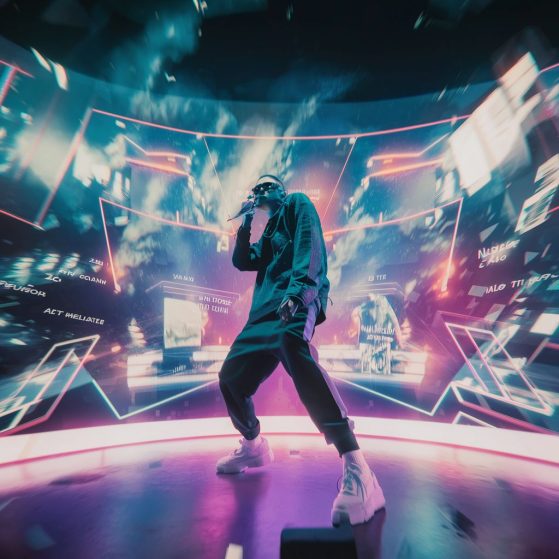Understanding Machine Learning in Music Marketing
Machine Learning: A Game Changer in Music Marketing
Machine learning has significantly transformed the music industry marketing landscape. It refers to the application of artificial intelligence (AI) that provides systems the capability to automatically learn and improve from experience without being explicitly programmed. In the context of music marketing – personal recommendation systems, customer segmentation, sentiment analysis, predictive modelling for churn management or sales forecasting are now built based on machine learning algorithms. These algorithms can analyze massive volumes of data and draw conclusions based on patterns or trends unseen by human eyes.
The Connection Between Machine Learning and Music Consumption Trends
One key area where machine learning is reshaping music marketing is in understanding music consumption trends. Through machine learning, marketers can identify patterns in what, when, and how users listen to music. This includes identifying popular genres, artists, or songs, as well as understanding listening habits across different demographics. It also includes behavioral analyses, such as which songs listeners tend to skip or repeat, their playlist creation behaviors, and even reactions to certain types of album artwork. All these insights can be used to develop more effective marketing strategies.
Utilizing Machine Learning for Personalized Marketing
Personalization is another monumental feature brought forth by machine learning. By analyzing listener preferences and behaviors, algorithms can predict what a user will likely want to listen to next, thereby tailoring personalized playlists and recommendations. This feature enhances the user experience and increases engagement, two critical elements in maintaining a strong user base in the competitive music streaming market. Simultaneously, it allows artists and record labels to target their promotion efforts more accurately, ensuring their music reaches the most receptive audiences, leading to higher conversion rates and better return on investment.
Role of Machine Learning in Identifying Music Trends
The Interplay of Machine Learning and Music
Machine learning, a subset of artificial intelligence, is significantly impacting the music industry by identifying and predicting music trends. It uses algorithms and statistical models to analyze vast amounts of music data, including songs, artists, music charts, playlists, and social media discussions among others, with minimal human intervention.
By sifting through this enormous data pool, machine learning can identify patterns and relationships, which it uses to classify, predict, and make decisions. A simple example would be predicting the popularity of a song by analyzing its tempo, genre, release day, and the artist’s previous track record.
Predicting Music Trends with Machine Learning
One of the main uses of machine learning in the music industry is predicting music trends. It does this effectively by considering various factors such as geographical location, individuals’ listening habits, and social media influence. It also takes into account historical data, allowing it to recognize patterns that signify the onset of a trend.
Machine Learning algorithms can model these patterns and give weightage to different predictors based on their significance. For instance, an international hit might give a strong weighting to social media buzz, while local trends may have more weight on individual listening habits.
Improving Music Discovery and Recommendation
Machine learning is not only capable of predicting music trends but also has a significant role in improving music discovery and recommendation. With streaming platforms boasting millions of songs, machine learning helps users discover new music tailored to their taste.
These platforms analyze user behavior, such as play count and skip rate, alongside the musical attributes of the songs themselves, to recommend new music. This personalized approach keeps users engaged, and it also promotes newer artists and tracks that might otherwise go unnoticed.
In conclusion, machine learning plays a key role in identifying and predicting music trends. It sifts through massive amounts of data, identifies patterns, makes predictions, and personalizes the music discovery process. The continuous development in this field presents an exciting future for the music industry.
Benefits of Utilizing Machine Learning in Music Promotion

Enhancing Predictive Analytics
One of the primary benefits of applying machine learning in music promotion revolves around predictive analytics. Through machine learning algorithms, it can forecast trends based on past and present data patterns. Which genres or artists are gaining traction? What lyrical themes resonate with listeners? These predictions, made possible by machine learning, optimize promotional efforts by highlighting what will likely be popular in the future.
Machine learning also allows the music industry to identify potential hit songs or artists early in their career. This proactive promotion can bolster success and maximize investments. Basically, machine learning expedites the process finding audience preferences and tailoring content to those preferences, ensuring effective and efficient promotion.
Generating Personalized Marketing Strategies
Personalization is another significant advantage of integrating machine learning into music promotion. Each listener is unique, with specific likes and dislikes. Machine learning algorithms understand these individual preferences and habits, enabling them to create personalized recommendations.
This one-to-one marketing is powerful because it directly engages the listener, increasing the likelihood of interaction and response. Machine learning, when applied to user data, creates meaningful suggestions for listeners, which enhances engagement and subsequently promotes music more effectively.
Enhancing Social Media Engagement
Social media is a crucial platform for music promotion. Machine learning has the capability to analyze vast amounts of social media data and derive actionable insights. It can determine what type of content generates the most interaction, the best time to post, the most engaged demographics, and more.
These insights enable strategic planning for music promotion, ensuring that promotional efforts reach the right audience at the right moment. The result is increased visibility and engagement for the artist or song being promoted. The integration of machine learning with social media strategies provides an opportunity to maximize effectiveness in music promotion.
Case Studies: Successful Applications of Machine Learning in Music Industry
Revolutionizing Content Curation and Recommendation
One of the most evident applications of machine learning in the music industry is the improvement and refinement of content curation and recommendation systems. One such example is Spotify’s “Discover Weekly” feature which uses a combination of collaborative filtering and natural language processing techniques to recommend new music to its listeners based on their listening behavior. This algorithm-driven playlist has been responsible for significantly increasing user engagement and has also facilitated new artist discovery.
Another noteworthy demonstration of machine learning technology is employed by Pandora’s Music Genome Project, a comprehensive music analysis and recommendation system that categorizes songs by analyzing up to 450 different musical attributes. The use of machine learning enables this system to make nuanced song recommendations based on listener preferences, thereby enhancing user experience.
Artists Discovery and Market Prediction
Machine learning algorithms have found their places in discovering emerging artists and predicting market trends within the music industry. By analysing data traits like listeners’ play count, search popularity and social media trends, platforms like Soundcloud and Next Big Sound provide predictive analytics signaling the next big hit or breakout artist. These insights serve as valuable information for music labels, marketers and even listeners looking out for fresh talents.
Music Composition and Production
The application of machine learning is not limited to just content curation and market prediction but extends to music creation itself. AIVA Technologies developed an AI called “AIVA” that composes classical music for films, adverts, and games. This AI analyses large datasets of classical music to understand music theory and composes unique melodies accordingly.
Similarly, Amper AI, designed for creators, allows users to produce custom music irrespective of their musical knowledge. It uses an extensive library of pre-recorded sections that can be assembled based on the creator’s specifications and preference.
These case studies all highlight the transformative role of machine learning in the music industry, from content curation and recommendation to trend prediction and even music composition. The continuous advancements in this technology offer promising prospects for the further evolution of the music industry.
Machine Learning Algorithms for Predictive Analysis in Music Trends
The transformation in musical trends, driven by the evolving tastes of listeners, has always been an interesting area for marketers and statisticians. With the advent of machine learning technologies, predicting these trends and patterns has become more accurate and efficient. Here, we will explore some of the key algorithms used in predictive analysis of music trends.
Collaborative Filtering Algorithms
Arguably the most commonly used algorithm in the music industry is Collaborative Filtering (CF). CF makes predictions based on the behavior of similar users or items, offering personalized recommendations. Music streaming services, like Spotify and Pandora, extensively use this technique to suggest songs that are likely to be appreciated by individual listeners based on their past behavior. This strengthens user engagement and retention, hence playing a pivotal role in trend analytics.
Deep Learning Algorithms
Deep Learning algorithms, a sub-field of machine learning, are becoming more prevalent in music trend prediction. These algorithms can sift through vast quantities of data to detect subtle patterns and preferences that would be undetectable to humans. By utilizing layered neural networks, deep learning can process data in complex ways, capturing the nuances of musical taste. For instance, Spotify’s Discover Weekly service uses a deep learning model to analyze users’ listening habits and offers them weekly personalized song recommendations, contributing significantly to setting new trends.
Time Series Forecasting
Machine learning can also be utilized in predicting future music trends through Time Series Forecasting. This approach is particularly useful in predicting the popularity of new songs or predicting the rise or fall of a genre over time. It works by analysing historical data and identifying patterns in the past to forecast future trends.
Overall, machine learning is revolutionizing the way music trends are analysed and predicted. By combining user preference data with intelligent algorithms, today’s music platforms can deliver highly personalized experiences, shaping future music trends in unprecedented ways.
Challenges and Opportunities in Implementing Machine Learning for Music Marketing

Overcoming the Hurdles in Machine Learning Applications for Music Marketing
One of the primary challenges in implementing machine learning methods in music marketing lies in the initial data collection and analysis phase. Music is a subjective art form, with influences, tastes, and trends continuously evolving. Creating a comprehensive database that reliably codes such multifaceted information is a pervasive challenge. Furthermore, the necessity to ensure data privacy adds another layer to this problem, requiring advanced encryption and anonymization techniques.
Adding to this, machine learning algorithms often require massive volumes of data to deliver reliable results. However, obtaining and processing such huge amounts of information is not always viable, especially for smaller artists or labels who may not have access to such resources.
Transforming Challenges into Opportunities with Advanced ML Techniques
Despite these hurdles, numerous opportunities are being presented by advancements in machine learning capabilities. Deep learning neural networks can handle large data volume and complexity, providing marketers with unprecedented insights into listener behaviour. These systems can identify subtle patterns and connections that may be missed by human analysis, thereby refining the targeting of marketing efforts and improving their efficiency.
Moreover, cutting-edge solutions like transfer learning or federated learning can help overcome some of the challenges related to data scarcity and privacy. For instance, transfer learning allows models to utilize knowledge gained from one task to improve performance on a separate but related task. Likewise, federated learning enables the training of machine learning models on many decentralised edge devices, preserving privacy by keeping all the training data on the original device.
Maximizing the Potential of Machine Learning in Music Marketing
The ultimate potential of machine learning in music marketing goes beyond the immediate application of data analysis and prediction. It serves as a tool to help understand the audience on a more profound level, including their listening habits, preferences, and even emotional responses to different music styles.
However, capturing this potential requires the adoption of a thoughtful and strategic approach. It involves integrating machine learning models within broader marketing strategy, ensuring they are well-suited to the specific objectives and needs of the music brand, and continuously updating them in response to new data and evolving trends. The successful implementation also mandates close collaboration between data scientists, marketers, and music industry personnel, each contributing their expertise to maximize the effectiveness of machine learning tools.
Future Outlook: Machine Learning’s Impact on Music Industry
Revolutionizing Music Creation and Composition
Machine learning’s impact on the music industry begins with song creation itself. AI algorithms are capable of analyzing patterns in musical data, learning from them, and creating new unique compositions. This opens up new opportunities for musicians, allowing them to experiment with different styles and techniques. Additionally, it also provides a platform for those who may have creative ideas but lack traditional musical training.
Transforming Music Marketing
Machine learning is reshaping how music is marketed and distributed. Predictive analytics, powered by machine learning, enables companies to predict consumer behavior, optimize marketing strategies, and track performance metrics. By analyzing historical data and identifying patterns in music consumption, machine learning can precisely target demographics likely to engage with specific genres or artists. This personalized, targeted strategy increases the efficiency and effectiveness of marketing campaigns and helps artists reach their potential audience more quickly.
Enhancing User Experience In Music Consumption
The way listeners consume music is also being transformed by machine learning. Streaming platforms utilize machine learning algorithms to understand user preferences, curating personalized playlists and suggesting new music based on listening habits. This not only improves user experience but also provides exposure to emerging artists that individual listeners might like. Moreover, machine learning can analyze lyrics, mood, and other song elements, further refining these recommendations.
Overall, the application of machine learning in the music industry promises to better unite artists and fans, revolutionize the process of music creation and distribution, and ultimately enhance the way we experience music.
Looking for a trusted and knowledgeable agency to help market your music career?
Contact us at + 1 626 872-5151 or info@flourishprosper.net
Or Checkout our website at flourishprosper.net




